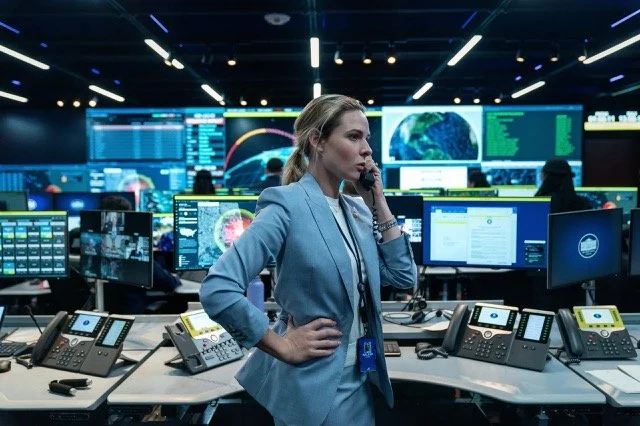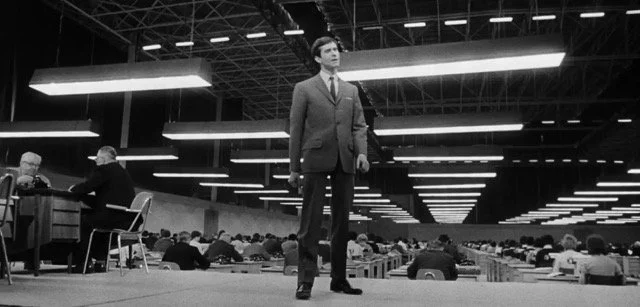Conclave, Political Anxieties, and Religious Finery
Released in the United States a week and a half before the 2024 presidential election, Edward Berger’s Conclave is undeniable as an imaginative political fable. Whether that was Berger’s idée fixe or a savvy studio manipulation of schedules, the film offers the audience (at the very least its American audiences) a peek behind the curtain into the mysterious process of election, albeit an election of a very different sort.
Conclave opens with the death of the pope and hardly a moment to grieve the monumental event before the machinery is required to start back up again. Cardinal Lawrence (Ralph Fiennes), dean of the College of Cardinals, is tasked with running the conclave, the sequestered voting process by which the next pope will be selected. Among the cardinals in attendance are friends and close colleagues, such as Stanley Tucci’s Bellini and John Lithgow’s Tremblay; the critical, conservative Tedesco (Sergio Castellitto); and newcomer Benitez (Carlos Diehz), an unknown cardinal ministering in Kabul. Isabella Rossellini also brings conviction to the film as Sister Agnes, leading the nuns who are supporting the cardinals throughout the conclave. Reluctant enough before these events, Lawrence undertakes this task as a yoke placed upon his shoulders, bending him low in pain. As the conclave progresses, Lawrence navigates willful personalities vying for power, intrachurch debates, scandals, secrets, and his own doubts.
Berger aims to create a tense film and is moderately successful. His talent is clear when it comes to his images: the marbled halls of the Vatican are crammed with sharply choreographed groups of ornate cardinals and nuns moving about, suffusing a sense of the significance of the proceedings. The cinematography (crafted by Stéphane Fontaine) is most acute when architectural, cutting between pillared courtyards and lavish staircases. Red bursts against the restraint of the proceedings and against the otherwise muted palette.
Beyond adding to the import, the cinematography also breathes in suspicion. When not focused on spaces, the camera is kept close to the characters—particularly Lawrence. Too close for intimacy, it becomes an agent of paranoia in itself. The camera vultures around Fiennes, the strain of every thought visible on his expression. Beyond Fiennes and Diehz’ performances, this is the most impressive aspect to Conclave: there is a false comfort in being close to someone. We think that nearness engenders warmth and guarantees honesty, but few things are as deceptive. As Lawrence uncovers secrets about various candidates, he also unveils gruesome aspects of his closest friends, and he realizes that even the departed pope was maneuvering in unexpected ways.
While visually vibrant, Conclave is thinly scripted. The film is intriguing to the extent that it explores the church’s institutional and spiritual dilemmas—which is to say, insubstantially. Ultimately the film is political, merely dressed in religious finery. There are nods to contemporary Catholic questions: the desire to return to Latin Mass, the church’s stance on homosexuality, how to relate to other beliefs around the globe. But these are mostly referenced as asides. This cardinal takes one stance, that one believes the opposite. These very real questions don’t result in dialogue or tension; instead, they provide clear delineation of where each papal candidate stands. Even Lawrence’s personal doubts (always a ripe narrative trope) are illusory. We don’t really find out anything about them, but Lawrence swears he has them.
Berger’s film is about power: who wants it, who receives it, and how it is transferred. It’s all party lines and political maneuvering and decisions made in dark rooms. In this regard the plot is flat and predictable, neither nuanced enough to provide sober reflection, nor lurid enough to offer baser shocks and thrills. (In hindsight, the final twist of the film is its most thought provoking one, generating some real reflective heft.) The most effective moment comes when Cardinal Benitez chastises the rest, noting that “these things are not the church,” as he elsewhere prays that God would inspire them “to remember the hungry, the thirsty, the sick, the lonely.” It’s a noble exhortation, but it’s not what the film is curious about.
Despite its predictable unfolding, Conclave is fascinating as a dual refraction of our contemporary political aspirations and fears. The setting and production design give a medieval sense to the proceedings, even as motorbikes and email make appearances. In a Barthesian manner, there are undercurrents of suspicion that both trouble and heighten the mystery. In the cardinals’ vestments, the shots of huddled groups whispering in deeply colored robes or masked from above by umbrellas, we feel the shudder of conspiracy. And this is knowingly constructed: most of the moments of levity in the film come from the juxtaposition between these images and our expectations. One old cardinal, looking like he came from a time of monarchs and robber barons, swipes distractedly on his phone. Another, who fights vindictively for a return to the older ways of Latin Mass and more rigid doctrine, is frequently vaping. We associate the images with ancient mystery and hidden power grabs, until modernity breaks through in amusing ways. But the significations (along with the piercing strings of the score) sustain the sense of paranoia in otherwise calm moments.
Such semiotic associations amplify our anxieties and refine our own political processes. How we fear that all the power resides in a small group of men making decisions behind locked doors, unseen by the public yet determining that public’s fate—a devious purity untouched by the very people most affected. Yet who wouldn’t prefer such ornate decorum and somber ritual to the image of American candidates bloviating on social media, reveling in televised disdain? By subsuming the religious realm under the political, Conclave allows us to dress up our political system, imagining something more mystical and elevated. The script (based on Robert Harris’ novel) also offers some wish fulfillment. As Lawrence uncovers secrets, the would-be popes fall like dominoes—all it takes is uncovering the truth. The formula appears simple, but it’s illusory.
Conclave is a solid, if predictable, film that wears its heart on its sleeve and its robes as a costume. The enriching visuals and enjoyable performances help smooth out an unremarkable script. There was a time when our political fantasies centered around the belief that, with the right mixture of verve and sincerity, we could convince each other to do what’s right. That world has long since faded. Welcome to our new political naïveté, the belief that a scandal revealed will be the final word, the offending candidate irrevocably sidelined. If only.



